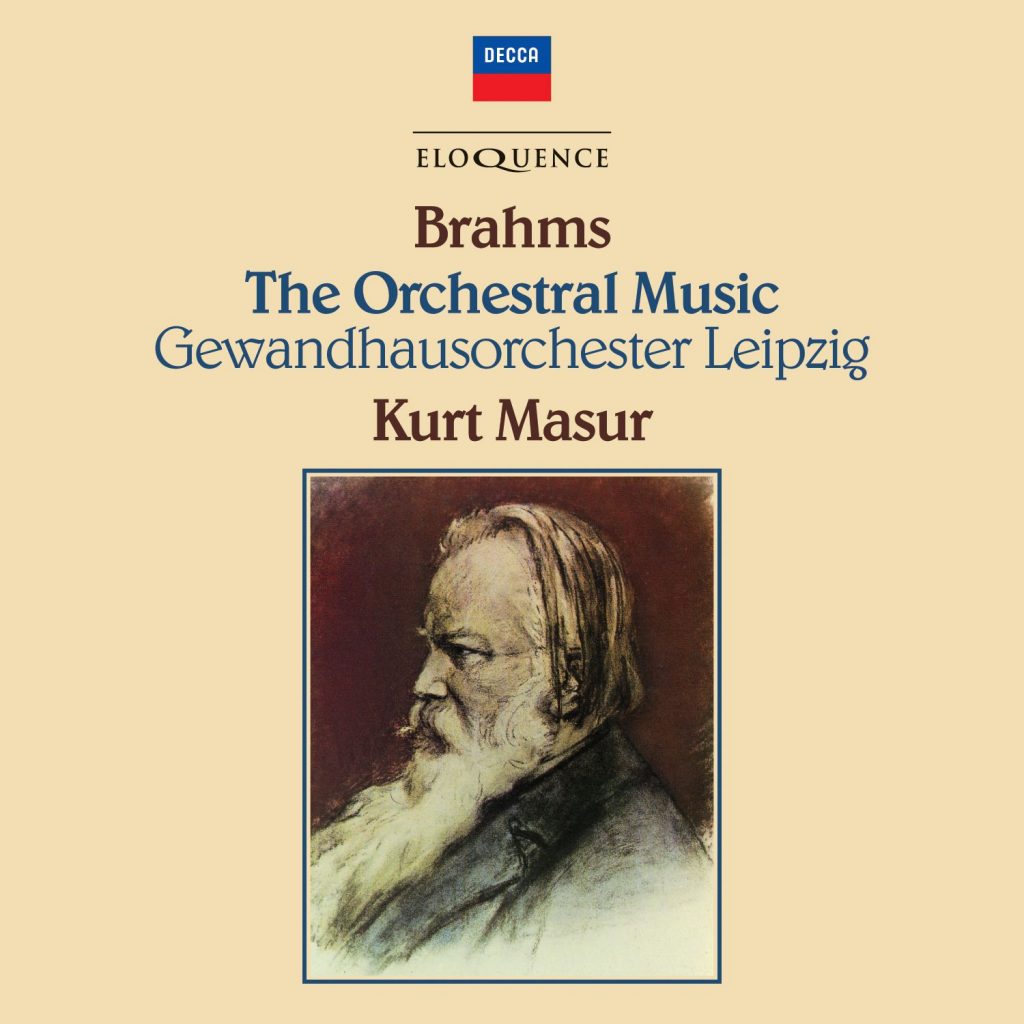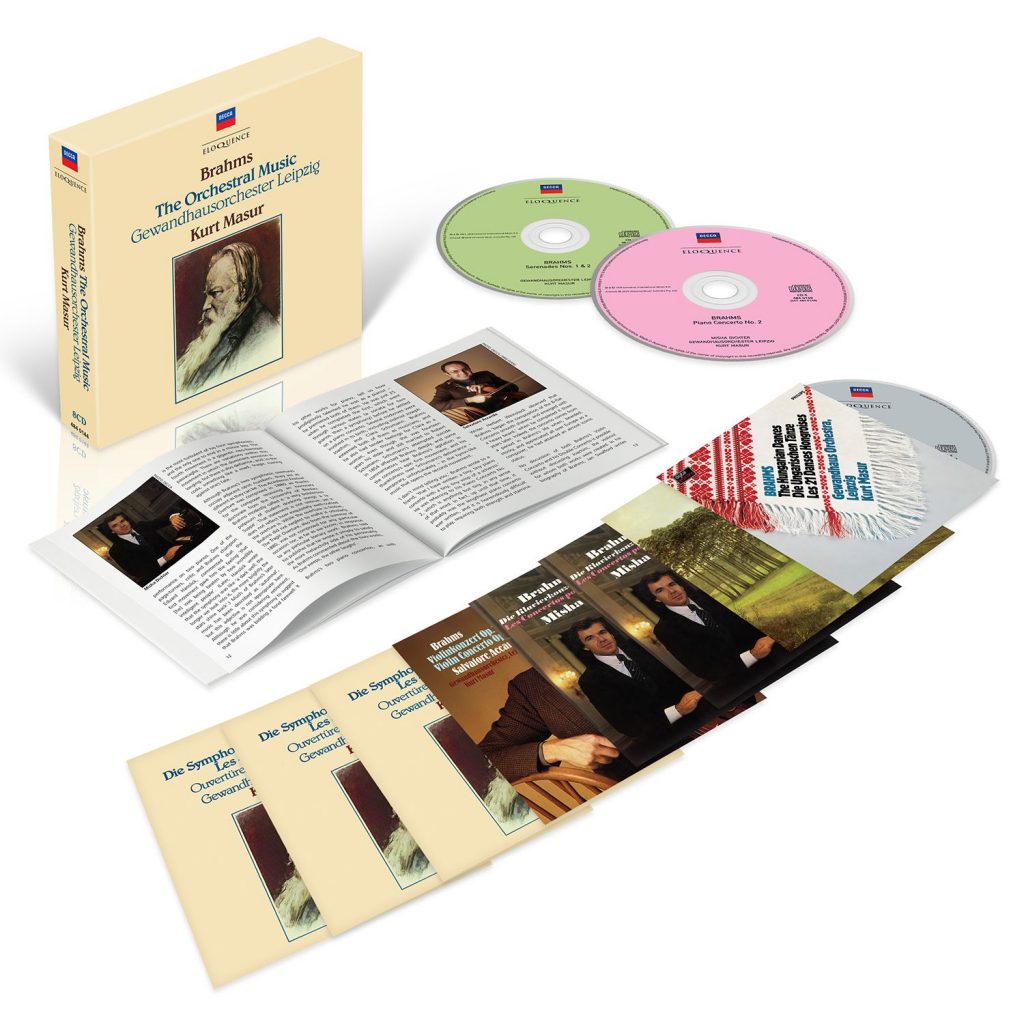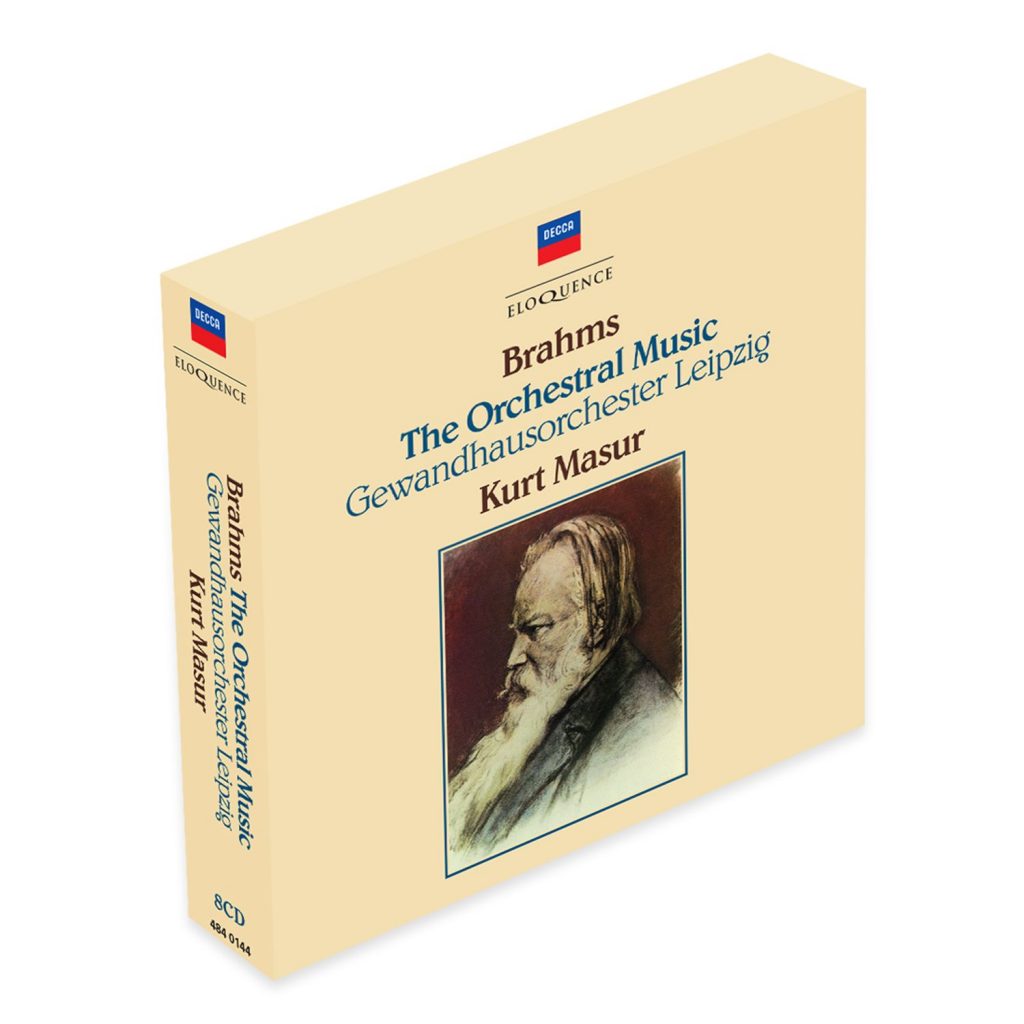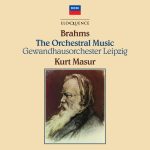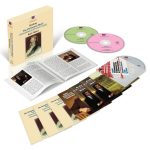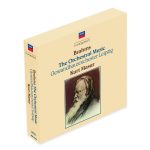Kurt Masur’s burnished readings of Brahms’s orchestral music with the Gewandhausorchester Leipzig, issued as a Limited Edition box with Original Jackets.
Hardly less than with its founder, Felix Mendelssohn, the Leipzig Gewandhaus grew up with Brahms conducting and playing. For a sense of heritage, the orchestra boasts a Brahms tradition second to none. In the words of Kurt Masur, their Kapellmeister for over a quarter of a century, ‘if they play Brahms, you can say it’s still authentic’.
Eloquence has compiled the Brahms recordings they made together between 1973 and 1981 for both the East-German Eterna label and Philips. Together they form the most comprehensive documentation yet issued of a musical relationship between composer, conductor and ensemble that was uniformly distinguished by deep understanding and affection. From the keyboard lion’s roaring of the First Piano Concerto to the rage and reconciliation of the Third Symphony and the mellow reflections of the Double Concerto, Masur and the Leipzigers present Brahms in the round.
‘Tradition is everything to the Gewandhaus,’ said Masur. ‘It’s what gives us our identity. It’s why we sound like ourselves and not like any other orchestra.’ The bedrock of that sound is a strong, unified string section with a density of timbre that supplies all the required weight for the post-Beethovenian drama of the First and Fourth symphonies. Masur maintained a narrow, brightly illuminated palette of wind tone-colours that lends a ruddy glow to the more pastoral tones of the Second as well as the rustic orchestrations of the Hungarian Dances and the oboe-led slow movement of the Violin Concerto.
The 1978 recording of the concerto finds its soloist Salvatore Accardo on his most honeyed and alluring form, contrastingly partnered in the Double Concerto by the gruffer, more outspoken tones of the cellist Heinrich Schiff. Masur and the Gewandhaus made several recordings of the piano concertos; Eloquence returns to the earliest and least-familiar of them, made with the American pianist Misha Dichter in 1977 when he was a peerless exponent of Liszt, in performances that grab the listener by the scruff of the neck and never let go.
JOHANNES BRAHMS (1833–1897)
CD 1
Symphony No. 1 in C minor, Op. 68
Variations on a theme by Haydn, Op. 56a
CD 2
Symphony No. 2 in D major, Op. 73
Symphony No. 3 in F major, Op. 90
CD 3
Symphony No. 4 in E minor, Op. 98
Akademische Festouvertüre, Op. 80
Tragische Ouvertüre, Op. 81
CD 4
Violin Concerto in D major, Op. 77
Salvatore Accardo, violin
Concerto for Violin, Cello and Orchestra in A minor, Op. 102
Salvatore Accardo, violin; Heinrich Schiff, cello
CD 5
Piano Concerto No. 1 in D minor, Op. 15
Misha Dichter, piano
CD 6
Piano Concerto No. 2 in B flat major, Op. 83
Misha Dichter, piano
CD 7
Serenade No. 1 in D major, Op. 11
Serenade No. 2 in A major, Op. 16
CD 8
Hungarian Dances Nos. 1–21
Gewandhausorchester Leipzig
Kurt Masur
CD 1-3
Recording Producers and Engineers: Bernd Runge, Claus Strüben, Heinz Wegner (Symphonies Nos. 1–4, Akademische Festouvertüre, Tragische Ouvertüre, Haydn Variations)
Recording Location: Studio Paul-Gerhardt-Kirche, Leipzig, Germany, January 1973 (No. 4), 25–27 February 1973 (Tragische Ouvertüre), 27–29 October 1976 (No. 2), September 1975 & October 1976 (No. 1), 4–5 January 1977 (No. 3, Akademische Festouvertüre); 13–16 September 1978 (Haydn Variations)
Original Philips LP Releases: 9500 514 (Symphony No. 1); 9500 515 (Symphony No. 2, Haydn Variations); 9500 516 (Symphony No. 3, Tragische Ouvertüre); 9500 517 (Symphony No. 4, Akademische Festouvertüre); 6769 009 (Symphonies, Overtures: boxed set)
CD 4
Recording Supervisor: Heinz Wegner
Recording Engineer: Claus Strüben
Recording Location: Studio Paul-Gerhardt-Kirche, Leipzig, Germany, 13–16 September 1978
Original Philips LP Releases: 9500 624 (Violin Concerto); 9500 623 (Double Concerto)
CD 5-6
Recording Producer: Bernd Runge (Piano Concertos)
Balance Engineers: Claus Strüben, Eberhard Richter (Piano Concertos)
Recording Location: Studio Paul-Gerhardt-Kirche, Leipzig, Germany, 20–25 June 1977 (Piano Concertos)
Original Philips LP Releases: 9500 410 (Piano Concerto No. 1); 9500 414 (Piano Concerto No. 2); 6769 013 (Piano Concertos Nos. 1 & 2: boxed set)
CD 7
Recording Producer: Heinz Wegner (Serenades)
Recording Engineer: Claus Strüben (Serenades)
Recording Location: Studio Paul-Gerhardt-Kirche, Leipzig, Germany, 1980 (Serenade No. 1); 13–16 September 1978 (Serenade No. 2)
Original LP Releases: Philips 6514 081, Philips/Eterna 827 529 (Serenade No. 1); Philips/Eterna 827 530 (Serenade No. 2; not released exclusively by Philips on LP)
CD 8
Recording Producer: Heinz Wegner
Balance Engineer: Horst Kunze
Recording Location: Studio Paul-Gerhardt-Kirche, Leipzig, Germany, 15–18 September 1981
Original Philips LP Release: 6514 305
‘A first movement notable for its flowing pace and characterful orchestral colouring … The second movement features the beautifully burnished sound of the Leipzig horns, followed by the strings’ deep, rich sonority toward the end … The finale is another example of gorgeous orchestral sound.’ Classics Today, July 2005 (Symphony No.4)
‘Misha Dichter plays the First Concerto with fierce concentration and lyric grace finely blended. Helped by first rate support from Masur and the Gewandhaus Orchestra, the impression his reading gives is one of long musical vistas finely focused.’ Gramophone, September 1980 (Piano Concerto No.1)
‘The suave tonal opulence and technical brilliance of both Accardo and Schiff are unquestionably impressive in the Brahms Double Concerto.’ Fanfare, September/October 1980 (Double Concerto)
‘the warm, natural, and robust ambience does ideal justice to Brahms’ glorious scoring … A positively addictive disc, and a bargain at that’ ClassicsToday.com
‘Salvatore Accardo presents one of the most lyrical performances of the Brahms concerto that has ever been recorded. Though it is leisurely in pace, it is never dull. Accardo is marvelously sure in his intonation. His double-stopping is amazing. Masur and the Gewandhaus Orchestra provide a perfect foil’ Fanfare, July/August 1982 (Violin Concerto)
‘The acoustic is clear and warm and this serves to enhance these performances by an orchestra and conductor who have this music in their bones … Very highly recommended.’ MusicWeb (Hungarian Dances)

